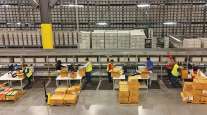Features Editor
Confronting COVID-19 in Workplace a Tall Task for Fleets

[Ensure you have all the info you need in these unprecedented times. Subscribe now.]
It takes a robust yet flexible plan from trucking companies to effectively build processes and procedures to curb the risks and spread of COVID-19 in the workplace.
That was the assessment of Katharine Weber, principal at law firm Jackson Lewis P.C., during a virtual session of American Trucking Associations’ Management Conference & Exhibition on Oct. 22. The Cincinnati-based law firm specializes in labor and employment law.
During her MCE session titled “Planning, Building and Bracing For COVID-19’s Continuing Impact on HR Issues in the Trucking Industry,” Weber walked through the steps needed to create a safe workplace, navigate federal and state laws and regulations, and deal with current COVID-19 challenges facing trucking companies.
With frequent changes to federal guidelines designed to limit the spread coupled with different variations of local and state laws, Weber noted, some workplaces run into challenges creating a robust strategy to combat the coronavirus.
“We find that the guidance that’s being issued by our various agencies changes on a frequent basis,” she warned. “Oftentimes, it’s with no advance warning whatsoever, and sometimes, it’s without much fanfare.”
Weber recommended attendees find guidance via federal, state and local agencies, and apply their planning through the workplace by conducting a “virtual walk-through.”
“You have to imagine that you are a member of each of the departments in your building,” she explained. “You have to … assume that, ‘Today, I work in the accounting department. I’m going to walk to the building from the ground level, in through the parking lot, going to take the elevator or stairway up. What am I going to see when I go to my workplace?’ ”
Weber noted conducting such walk-throughs can help identify points where management can take action to limit the spread of COVID-19 in each department. But each department will be slightly different.
“There will be opportunities to make changes at the docks, and there will be opportunities where you can make administrative changes in terms of your policy, practice and protocols,” she added.
In making those changes, Weber focused on building practices. She phrased the process as “Clean it, Screen it, and Mean it.”
“I’m talking about cleaning the workplace, screening your employees and setting up policies and practices to show that you mean it,” Weber explained. “That is really what it boils down to because as an individual, the CDC says that these are the three things that employees need to do.”
Sanitizing high-touch areas in the workplace, encouraging sick or exposed co-workers to stay home and regularly wearing masks and practicing social distancing, Weber said, will work if management can successfully convey that message to employees.
She described the cleaning practices as akin to “keeping your kitchen clean.”
“What are the things that you are doing every day to make sure the place is clean and not exposing your family to unnecessary risk?” Weber said. “It’s cleaning, it’s sanitizing, it’s making sure to the extent that [someone uses] a tissue, it’s going into the trash.”
For workplace areas that may have been frequented by someone who has been exposed, Weber recommended deep cleaning and checking for proper ventilation.
Communication with employees is vital when discussing contact tracing. Building trust is helpful to combat the virus and end it as soon as possible.
“Just to say that, ‘Hey, you need to stay home if you had close contact with someone who has been diagnosed or tested positive for COVID’: They don’t know what that means,” she said. “You’re going to have to make sure that you have great communication pieces out there.”
This isn’t a one-time undertaking, Weber stressed, it is a constant.
“We don’t want them to get so weary of listening to us about COVID-19 that they turn us off,” she said, “but we do need to make sure that they are reminded of what we need from them today.”
Weber recommended trucking companies implement the use of a daily symptom (and exposure) assessment for employees. Most importantly, she noted, companies need to know whether that time is compensable.
It also is time for drivers to fully accept face masks. Weber explained that those regulations should be followed as much as any driving law, adding that infractions could start a chain reaction of legal trouble for trucking companies as well as their shippers.
“Masks are like speed limits; live them, love them, all of them,” she said.
In the unfortunate circumstance of applying protocol for a diagnosed employee, Weber stated that those in management must make it a point to show empathy.
“When the person calls you,” she explained, “the last thing you want to say is, ‘Oh, great!’ You need to put on your empathic hat, and say, ‘What can I do to help you?’ You want to make sure that you are there for that person.”
After establishing the relationship, it is important to help contact trace and find those who may have been exposed in the workplace, Weber said.
With COVID-19 exposure, companies need to prepare to handle for more employee time off or work-from-home requests. HR management will have to determine if it falls under multiple laws, including the Family and Medical Leave Act.
“You have to remember, family medical leave is not just for pregnant people,” Weber said. “It’s also going to apply in those situations where someone has a long-term or chronic condition.”
Companies also should make reasonable accommodations when applicable, Weber said. In addition to COVID-19 exposure, some employees may have to deal with school closing that affects child care.
“They have a situation where they have double duty,” she said. “So, make sure to keep that in mind and remain flexible.”
Want more news? Listen to today's daily briefing:
Subscribe: Apple Podcasts | Spotify | Amazon Alexa | Google Assistant | More





